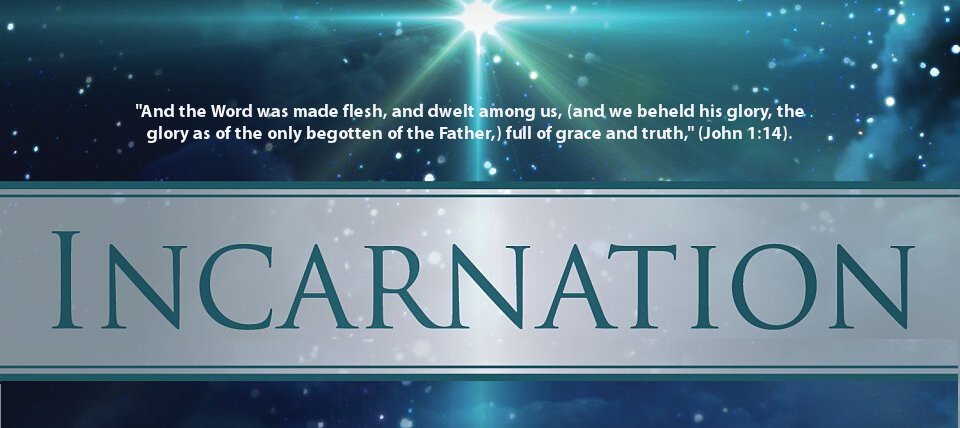“And the Word was made flesh and dwelt among us (and we beheld his glory, the glory as of the only begotten of the Father) full of grace and truth.” (John 1:14)
As the Apostle John opens his gospel, it seems as if he’s expanding and elaborating on the creation account in Genesis 1, “In the beginning was the Word, and the Word was with God, and the Word was God. He was in the beginning with God. All things were made by Him, and without Him nothing was made that was made.” But then in verse 14 of that same chapter John moves the reader forward roughly 4000 years to let it be known that that same Word “was made flesh and dwelt among us.”
This incarnation – when divinity became humanity – marked the most significant paradigm-shifting period in human history and was therefore foretold and foreshadowed countless times throughout the Old Testament. One such example recorded over 600 years prior to Messiah’s coming to earth is that beautiful prophecy by Isaiah, “Behold, a virgin shall conceive, and bear a son, and shall call his name Immanuel [God with us],” (Isa. 7:14).
In God’s infinite wisdom, mercy, and grace he prepared the way by which his people could be rescued from the dark and deathly abyss of the fall (John 3:16; Isa. 53:6). And at the core of the Father’s redemptive plan we find this mystery of the Word becoming flesh.
The all-encompassing scope of Christ’s substitutionary sacrifice and mediatory work on our behalf necessitates him coming to earth in the likeness of sinful flesh while remaining holy, harmless, and undefiled. “And being found in appearance as a man, He humbled Himself and became obedient to the point of death, even the death of the cross,” (Phil 4:8; see also Isa. 50:6; Luke 1:35). This is the miracle of redemption, the miracle of incarnation. The miracle of God with us.
Christ is the only begotten Son of God, the first fruit of all who have since been adopted as children of God and joint heirs with Christ. Because Christ took on the form of men and dwelt for a time in an earthly body in obedience to the will of the Father, his substitutionary death on Calvary makes possible our death to sin and the condemnation it bears. His resurrection paves the way for us to be raised to new and everlasting life in him. And his ascension demonstrates that our ultimate destination is heaven, to forever be where he is.
Was it necessary that our Redeemer be God incarnate? Yes, absolutely! Only the perfect God could become perfect man possessing the sufficiency and wherewithal to satisfy the wrath of the Father and pay the required price of redemption with innocent blood that washes away the sin of the world (Isa. 43:25, 53; Dan. 9:17, 19).
“That the nature which had offended might suffer, and make satisfaction, and so he might be every way a fit and sufficient Savior for men (Heb. 2:10-17).”[1] The Creator suffered, though not in himself, but in the assumed human nature of the creature, so that a just and holy God would be satisfied with the sacrifice of his own Lamb without blemish and without spot, the only sacrifice of infinite value found worthy to pay for the sins of his people.
Contemplations:
- This mystery of the incarnation of your Son was completed that he might be in all points like us, yet without sin. As the angel spoke to Mary, “The Holy Ghost shall come upon thee, and the power of the Highest shall overshadow thee; therefore also that holy thing that shall be born of thee shall be called the Son of God,” (Luke 1:35). The overshadowing of the Holy Spirit and the power of the Highest brought this wonderful miracle to pass. This mystery is as great a mystery as that of the Trinity – that God was manifest in the flesh. Jesus Christ assumed the cloak of humanity so that he might be my Savior. What a wonderous, humbling thought Lord!
- The Incarnation of the Word is integral to the Gospel – Word and man, two natures in one person. He is the head of his body, the one who joins his members to himself and to his Father as adopted children, the bridegroom who through his bride, the Church, provides the sacramental means whereby he shepherds his flock. He is God omnipotent who through his infinite love for us became man, an unsurpassed act of humility that we, his disciples, are to model.
- How seasonable was this work of mercy and grace to save sinful man, both in its general exhibition to the world in the incarnation of Christ and in his particular application of it to the soul of every lost sinner by the Spirit!
Further References for John 1:14:
Heb. 2:14; 1 Tim. 3:16; 1 John 4:2; Phil. 2:7
[1] John Owen, Dr. John Owen’s Two Short Catechisms (London: Printed for and sold by Will. Marshal .., 1700), 28.


